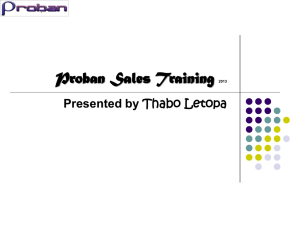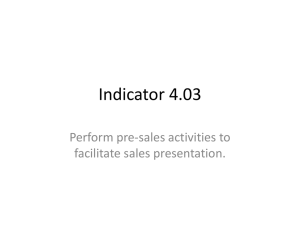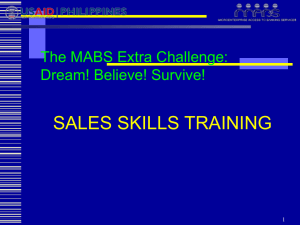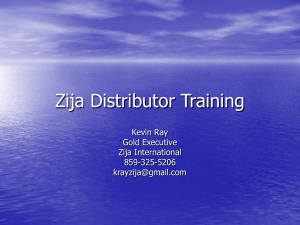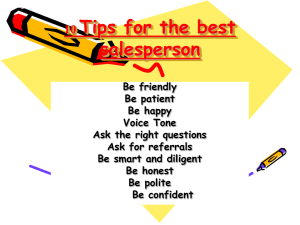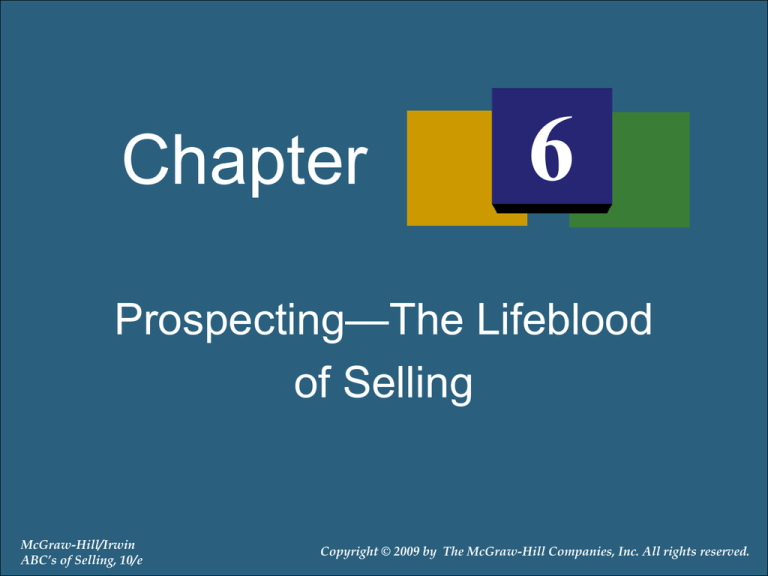
Chapter
6
Prospecting—The Lifeblood
of Selling
McGraw-Hill/Irwin
ABC’s of Selling, 10/e
Copyright © 2009 by The McGraw-Hill Companies, Inc. All rights reserved.
Main Topics
The Tree of Business Life: Prospecting
The Sales Process Has 10 Steps
Steps Before the Sales Presentation
Prospecting—The Lifeblood of Selling
The Leaking Bucket Customer Concept
Where to Find Prospects
Planning a Prospecting Strategy
Prospecting Methods
Prospecting Guidelines
6-2
Main Topics, cont...
The Referral Cycle
Call Reluctance Costs You Money!
Obtaining the Sales Interview
Wireless E-mail Helps You Keep in Contact and
Prospect
6-3
The Tree of Business Life:
Prospecting
T
T T
T T TT
T T T T
Builds
Guided by The Golden
Rule, remember:
Relationships
People buy from those they
know and trust
Prospecting is not easy unless
you focus on helping, not selling
People who trust you give
referrals
Referrals take the burden of
prospecting off the salesperson
Referrals are earned through
integrity, trust, and character
6-4
Exhibit 6-1: The Selling Process Has
10 Important Steps
The sales process is a
sequential series of
actions
1. Prospecting
2. Preapproach
3. Approach
4. Presentation
5. Trial close
6. Determine objections
7. Meet objections
8. Trial close
9. Close
10. Follow up
6-5
Some Prospect, Some Do Not
Many salespeople prospect, both those selling
business-to-business and those selling to
consumers
Examples are:
Financial services as life insurance
Real estate
6-6
Some Prospect, Some Do Not, cont…
Many organizations do not prospect
Examples are large consumer goods firms, such
as General Mills* and Colgate*
* products and associated images used for illustrative purposes only
6-7
Compensation for the Salesperson
that Prospects is Sometimes:
Based upon 100% commission – if you do not sell,
you do not earn
6-8
Compensation for the Salesperson
that Does Not Prospect is Often:
Based upon mostly salary with a small bonus and
expenses such as car and office supplies paid
If you do not sell you still get paid, but not for very
long
6-9
The Prospector Has the Most
Challenging Sales Career
This is the “order getter” who:
Finds a lead
Converts the lead into a prospect
Sells one day, and
Sells in the future too
WOW! That is a challenge
6-10
Steps Before the Sales Presentation
Prospecting > Appointment > Planning
Rule of thumb
40% preparation
20% presentation
40% follow-up
6-11
Exhibit 6-2: Before the Sales Presentation
6-12
Prospecting–The Lifeblood of Selling
Prospecting – identifies potential
customer
Lead – name of a person or
organization (also referred to as a
suspect)
Prospect – qualified person or
organization
6-13
Prospecting — The Lifeblood of Selling
Prospecting – identifies potential customers
Lead – might be a prospect
Prospect – qualified person
Is prospect MAD? Does he or she have:
Q1. Money to buy?
Q2. Authority to buy?
Q3. Desire to buy?
…Then, prospect is Qualified
Prospecting–The Lifeblood of Selling
Sales Prospecting Funnel
All leads and prospects must be considered and filtered
through the MAD process before they become qualified
prospects
6-15
The Leaking Bucket Customer
Concept
All salespeople lose X amount of sales and
customers per year. This is illustrated in the
Leaking Bucket Customer Concept:
Customers come into the top and leave through a hole
in the bottom
6-16
Where to Find Prospects
Sources may be varied or few
Persons selling different services and goods might
not use the same sources
6-17
Planning a Prospecting Strategy
Prospecting requires a strategy
A skill that can be constantly improved
6-18
Exhibit 6-4: Prospecting Methods that
Work!
6-19
Prospecting Methods
E-prospecting on the Web
Individuals
Organizations
(1)Cold Canvassing – law of averages
(2)Endless Chain – customer referral
Customers and customer referrals best sources of
future sales
(3)Orphaned Customers
(4)Sales Lead Clubs
6-20
Prospecting Methods, cont…
Prospect Lists – trade pubs, list-selling firms
Become an Expert – get published
(5)Public Exhibitions and Demonstrations
(6)Center of Influence
Direct Mail
(7)Telephone and Telemarketing
Observation
(8)Networking (center-of-influence people)
6-21
Exhibit 6-5: The Processing System
Within a Telemarketing Center
6-22
Exhibit 6-6: Reports From a Telemarketing Center
to Other Marketing Groups Within the Firm
6-23
Prospecting Guidelines
Three criteria are:
1.Customize to each prospect
2.Concentrate on high potential customers fruit
3.Call back on no-buys
Always keep knocking on prospect’s and
customer’s door to help them
6-24
Referrals Are Used in Most
Prospecting Methods
Eight of the twelve popular prospecting
methods directly ask for referrals.
Referrals can be directly used in:
Cold canvassing
Endless chain customer referrals
Orphaned customers
Sales lead clubs
Public exhibitions and demonstrations
Center of influence
Telephone
Networking
6-25
The Prospect Pool
Leads
Referrals
Orphans
Your customers
6-26
Exhibit 6-7: Components of the
Prospect Pool
6-27
The Prospect Pool
Leads – know very little or nothing about
Referrals – learned from referrer
Orphans – company records
Your customers – most important prospects
6-28
The Referral Cycle
Obtaining referrals is a continuous process without
beginning or end
Referral cycle – when and how to ask for referrals
The parallel referral sale
Sell the product to person
Obtain prospect name(s) from person
6-29
Exhibit 6-8: The Referral Cycle:
When to Ask for Referrals
6-30
The Referral Cycle cont…
The secret is to ask correctly during referral
cycle
The preapproach contact phase
Mention personal contact
The presentation
Build rapport (high-context cultures), explain agenda
Product delivery contact phase
Service and follow-up contact phase – customer
service
Ongoing opportunities to maintain contact with customer
Don’t mistreat the referral
Be professional
Follow through on what you have told referral
Don’t Mistreat the Referral
Mistreatment can have a ripple effect
The mistreated referral tells your customer – you
may lose both!
Remember to follow the Golden Rule
6-32
Treat the Referral Like a Customer
Once you have sold the referral, and gotten more
referrals, ask the new customer to contact the
referring customer on her experience with the
salesperson
Now you have two customers giving referrals
This can create an endless chain of referrals
quickly filling your prospect pool with only
customers and referrals
Now, no more cold calling
6-33
Call Reluctance Costs You Money!
Call reluctance refers to not wanting to contact a
prospect or customer
For many salespeople, owning up to call
reluctance is the most difficult part of combating it
Call reluctance keeps you from:
Helping others
Earning what you’re worth
6-34
Obtaining the Sales Interview
Key factor in selling process is obtaining a sales
interview
The benefits of appointment making
Telephone appointment
Personally making the appointment
Believe in yourself
Develop friends in the prospect’s firm
Call at the right time on the right person
Do not waste time waiting
6-35
The Telephone Appointment
Plan and write down what you want to say
Clearly identify yourself and your company
State the purpose of your call and outline how
prospect may benefit from the interview
Prepare brief sales message – stressing benefits over
features and only enough info to stimulate interest
Do not take no for and answer – be persistent
Ask for an interview so you can further explain
benefits
Phrase your appointment request as a question
6-36
Wireless E-Mail Helps you Keep in
Contact and Prospect
Wireless E-mail helps keep the sales
representative mobile.
6-37
Summary of Major Selling Issues
The sales process involves a series of actions
beginning with prospecting for customers
Find prospects to contact
Obtain appointments
Plan the entire sales presentation
6-38
Summary of Major Selling Issues,
cont…
Popular prospecting methods
Cold canvas
Endless chain methods
Public exhibitions and demonstrations
Locating centers of influence
Direct mailouts
Telephone and observation
Salesperson must develop ways of getting to see
the prospect
6-39

